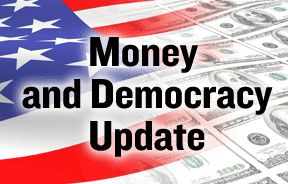E.J. Dionne Jr. in the WaPo says that if the lame duck Congress has a spine, it would reconsider the DISCLOSE Act in the final days of its term. The DISCLOSE Act would make the outside groups that are raising money for “independent” political ads disclose who is paying for the ads. As we saw this past election, corporations and wealthy donors can give anonymously to these front groups and unions and avoid accountability to voters. Dionne writes:
Shortly after the election, Michael Isikoff and Rich Gardella of NBC News reported that one of the big Republican secret-money groups, Crossroads GPS, got “a substantial portion” of its money “from a small circle of extremely wealthy Wall Street hedge fund and private equity moguls.” These contributors “have been bitterly opposed to a proposal by congressional Democrats – and endorsed by the Obama administration – to increase the tax rates on compensation that hedge funds pay their partners.”
It shouldn’t take investigative reporting after the fact for voters to learn such things. [Sens.] Snowe, Collins and Brown say they are for disclosure, as does Mark Kirk, the new Republican senator from Illinois. Senate Democratic leaders should give them a chance to prove it by bringing up the bill.






















